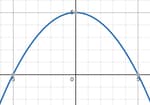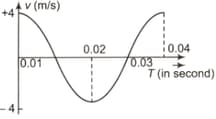Simple Harmonic Motion
Simple Harmonic Motion: Overview
This Topic covers sub-topics such as Simple Harmonic Motion, Amplitude, Phase, Periodic Motion, Oscillatory Motion, Simple Pendulum, Time Period, Mean Position, Restoring Force, Energy in SHM, Time Period and Frequency and, Initial Phase
Important Questions on Simple Harmonic Motion
The total energy in simple harmonic motion at the extreme position is purely kinetic.
The total energy in simple harmonic motion at the mean position is purely kinetic.
The displacement of a particle of mass performing SHM with amplitude and angular frequency is given by
Derive an equation of kinetic energy for this particle in terms of time.

The graph shown in the above diagram shows the change in kinetic energy of a particle performing SHM with respect to its displacement. The kinetic energy is measured in the units of and displacement is measured in the units of . Determine the force constant of this particle in the units of .
If is the amplitude of a particle performing SHM, then at what point on the displacement axis of energy vs. displacement graph does the graph of kinetic energy and potential energy intersect?
Which one of the following is the correct acceleration vs. time graph for a particle performing SHM?
Which one of the following is the correct graph for acceleration vs. displacement of a particle performing SHM?
Which one of the following pair of particles are having opposite phase?
Which one of the following pair of particles performing SHM are in phase with each other?
Is restoring force in an SHM directed towards mean position?
What is the initial phase and how it plays an important role in SHM?
A spring has a natural length of and a force constant of . A body of mass is suspended from it and the spring is stretched. If the body is pulled down to a length of and released, it executes simple harmonic motion. What is the net force on the body when it is at its lowermost position of its oscillation? (Take ).
Under the action of a force , the motion of a particle is ( a positive constant)
A mass of is attached to the lower end of a massless spring of force constant , the upper end of which is fixed to a rigid support. Which of the following statement is true?
The ratio of kinetic energy at a mean position to potential energy at of a particle performing is
A body is vibrating in simple harmonic motion. If its acceleration is at a displacement then time period is
A particle of mass oscillates with simple harmonic motion between points and , the equilibrium position being at . Its potential energy is plotted. It will be as given below in the graph,
The velocity-time diagram of a harmonic oscillator is shown in the below figure. The frequency of oscillation is

Particle performing starts from extreme position. Plot a graph of displacement, velocity and acceleration against time.
